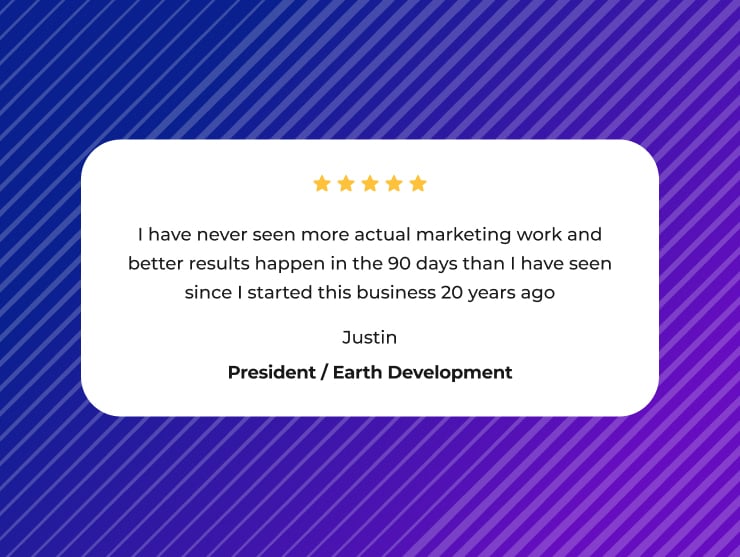Local SEO can help your contracting business improve its visibility in Google search results. Optimizing your local SEO means more traffic, more conversions, and more sales. For small businesses, it’s a potent strategy to beat the competition because you’re targeting a niche, local audience close by. Almost 50% of all Google searchers are looking for local information. Utilizing local SEO for contractors makes sure they find you and helps grow the online presence and reputation of your contracting business. Here’s how:
What Is Local SEO for Contractors, and Why Does It Matter?
Local SEO for contractors is a niche SEO strategy aimed at optimizing a business’s digital presence for users who conduct location-specific searches. It helps your business appear frequently in response to searches from customers located in the same geographical area as you are.
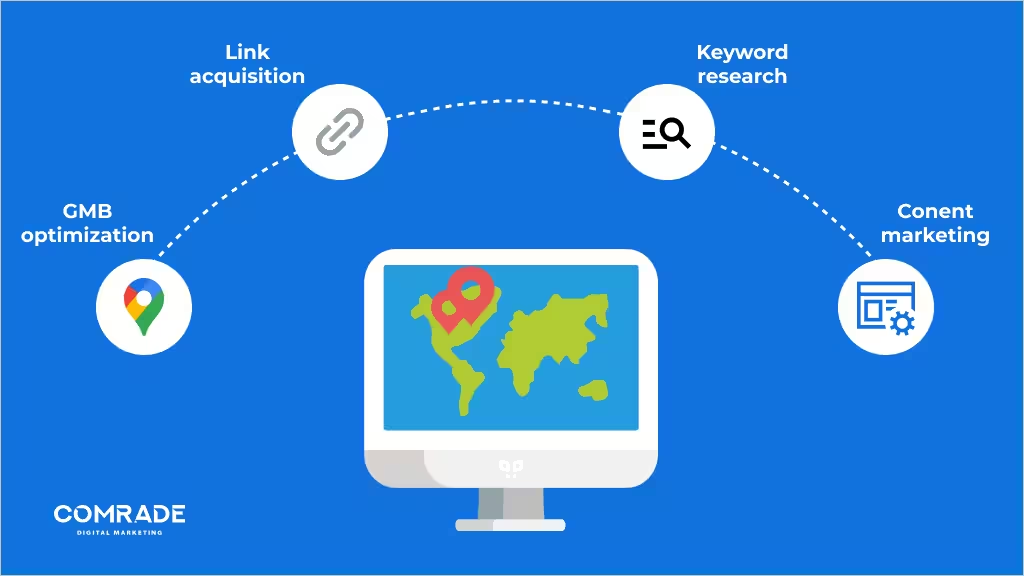
Common local SEO strategies include a combination of Google My Business optimization, optimizing your Google Business Profile, link acquisition, keyword research, and content marketing to drive qualified, local traffic to your website and brick-and-mortar store. These tactics improve customer retention and ensure you stay competitive with neighboring businesses.
Benefits of a Local SEO Strategy for Contractors
Did you know over 90% of consumers use online searches to find a local business? Local SEO not only improves your online visibility but also your business. Successful local SEO campaigns offer numerous benefits:
- Reach 82% of customers using mobile devices to search online.
- Present yourself as an expert in your region and increase conversion rates. As much as 28% of local searches result in sales!
- Outrank competitors when you appear on Google’s Local Pack and on Google Maps.
- Get your message in front of the customers who matter most.
- Earn more qualified website traffic and boost sales.
- Match customers’ organic search intent and lower paid advertising costs.
Local SEO is particularly beneficial for a contracting business, helping to grow its online presence and reputation.
Another advantage is local SEO strategies yield consistent and long-lasting results. Of course, you’ll need to keep your business profile updated, but once it starts to rank well, it’ll maintain its position for a long time, slowly accruing a loyal customer base.
8 Local SEO Tips for Contractors
There are plenty of aspects to SEO strategies, but for now, you can follow these eight tips to move the needle for your company in the local landscape. One crucial element to start with is optimizing your Google Business Profile. This will help you appear in the local search pack, gain an edge over competitors, and ensure consistent visibility in local search results.
1. Claim Your GMB Profile
All local SEO efforts start with a Google My Business Profile (GMB). GMB allows you to manage your online presence across the entire Google platform and is primed for local SEO. When the majority of customers search for contractors online, they turn to their smartphones and Google.
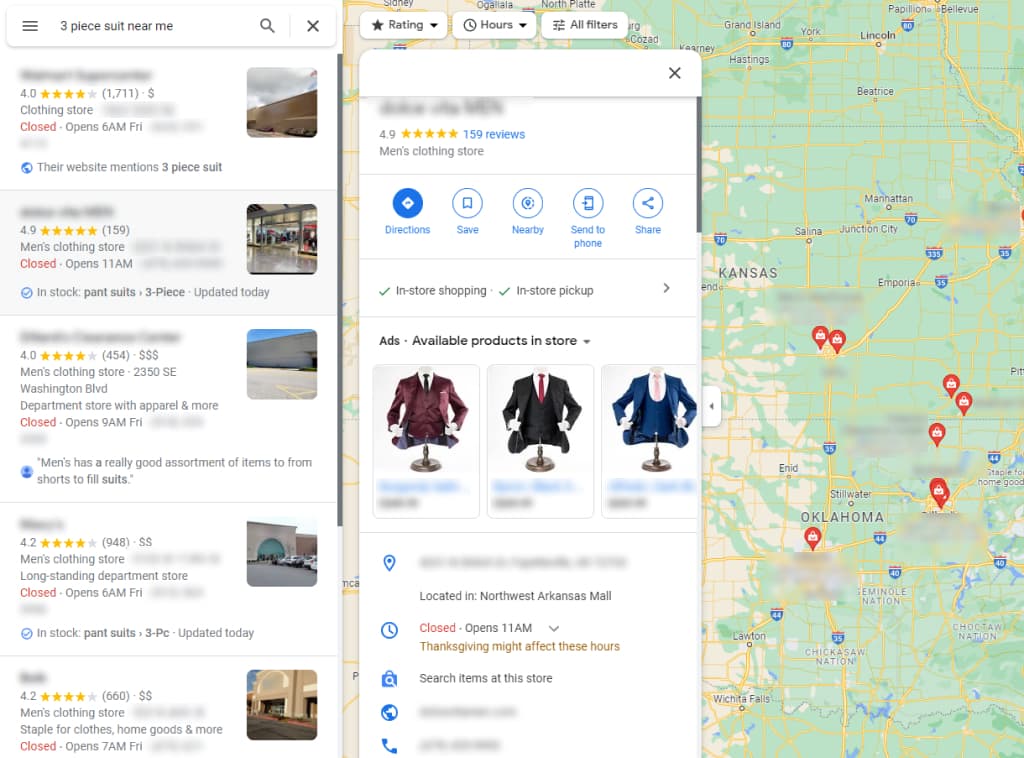
If you’ve ever searched Google for a business and several companies pop up along with their locations on Google Maps, you’ve experienced local SEO in action. The only way to get your business to rank in the same prized position is by claiming and optimizing your free GMB profile.
Tips for Optimizing Your GMB Profile
Getting listed on Google is easy. Ranking at the top in the Google Map Pack (or Local Pack) is a little more challenging. However, following our local SEO tips for general contractors can help you get there.
In the Google Map Pack, businesses are listed alongside their geographic location, contact information, and other helpful details. Once you’ve created your GMB profile, be sure to:
- Fill out all your details as accurately as possible.
- Provide ways to contact your business (phone number, website, physical and email addresses).
- Add high-quality photographs.
- Provide a brief description of your business.
A GMB profile is a lot like a digital version of the Yellow Pages. For small businesses, it provides free advertising and an opportunity to level with larger competitors. People who find a business through a GMB listing are up to 50% more likely to convert into paying customers.
Claiming your GMB profile and completing the necessary steps is the first thing you need to do to keep your business relevant and ensure it appears in search engine results. If you run a business that has offices in several locations, you should register them as separate profiles.
Comrade Digital Marketing Agency can help you with the above if you’re unsure how to go about it. Schedule a free consultation.
Use the Google Posts Feature
Google Post allows you to post content directly into search engine results pages. Each post can be up to 300 words long and include a photo, date range (for events), and a clickable call to action. While these posts only last seven days, except for events-based ones that are removed after the event date, using them shows Google you’re actively managing your listing.
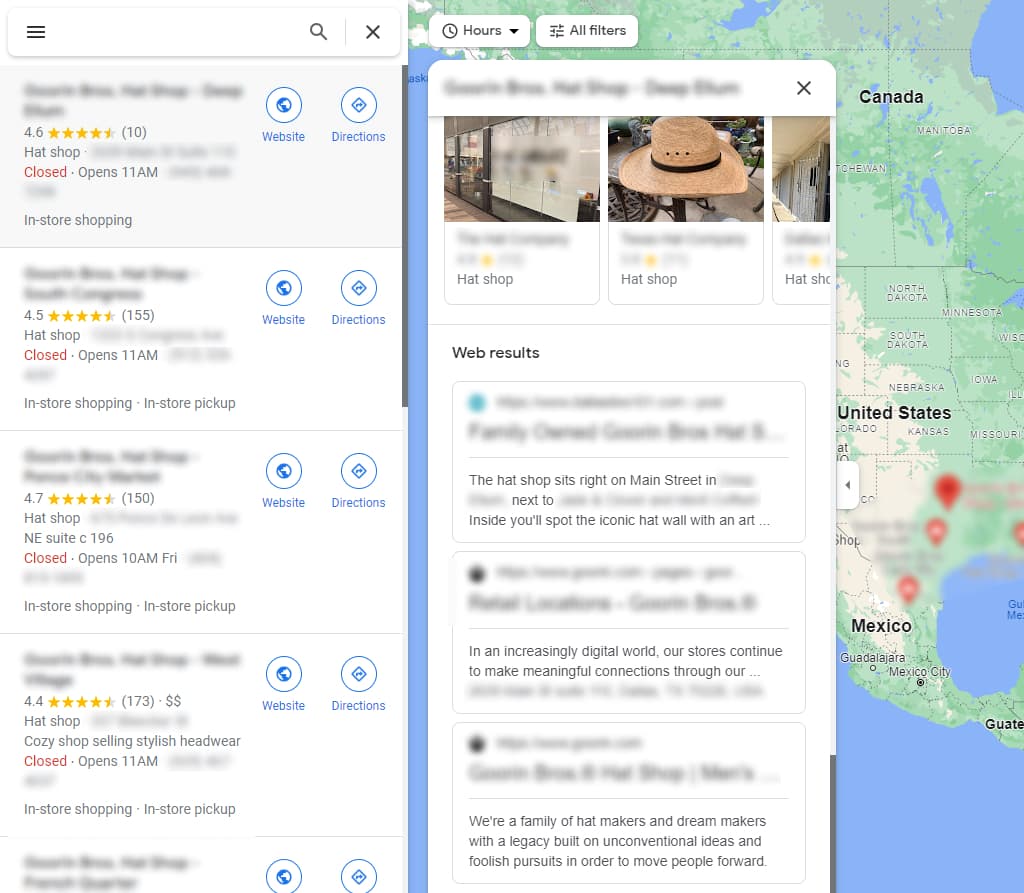
You can take this one step further and share them on social media. While social media isn’t a direct ranking factor, it works together with SEO to provide your audience with value and relevance. When you get traffic to your Google Posts page, you signal to the search engine that you offer valuable content and updates.
Boost your business with better search rankings! Check out our guide to SEO for contractors and get started.
2. Check Your NAPs
Having a consistent NAP is an often overlooked but important local SEO tactic that can impact your website’s performance by 16%. NAP is an acronym for Name, Address, and Phone number. These details typically appear on your website and other online directories like Facebook, Yelp and Home Advisor, etc.
In terms of your local SEO strategy, it’s vital all your NAP listings are the same, and up to date. Any discrepancies make search engines doubt the validity of your NAP information. And since incorrect information can lead to a poor user experience for prospective customers, differences in NAP between your listings will result in lower rankings.
For example, even small differences like writing “boulevard” in one listing and abbreviating it to “blvd” in another is a no-go. Search engine algorithms value consistency. When all your listings are the same, Google can confidently promote your business.
Consistent NAPs also increase your chances of appearing in the Local Pack. Studies show if your contractor or construction business pops up here, you’ll have a higher click-through rate—as much as 42% of local searches result in clicks on the Google Map Pack.
Looking for website inspiration? Learn what sets apart the best contractor websites from the rest.
3. Register in Local Directories
Search engine crawlers index websites and platforms that have information about your businesses. The more you list your general contractor business on trusted websites, the more data search engines have to analyze your business’ information and rank it higher in local search results.
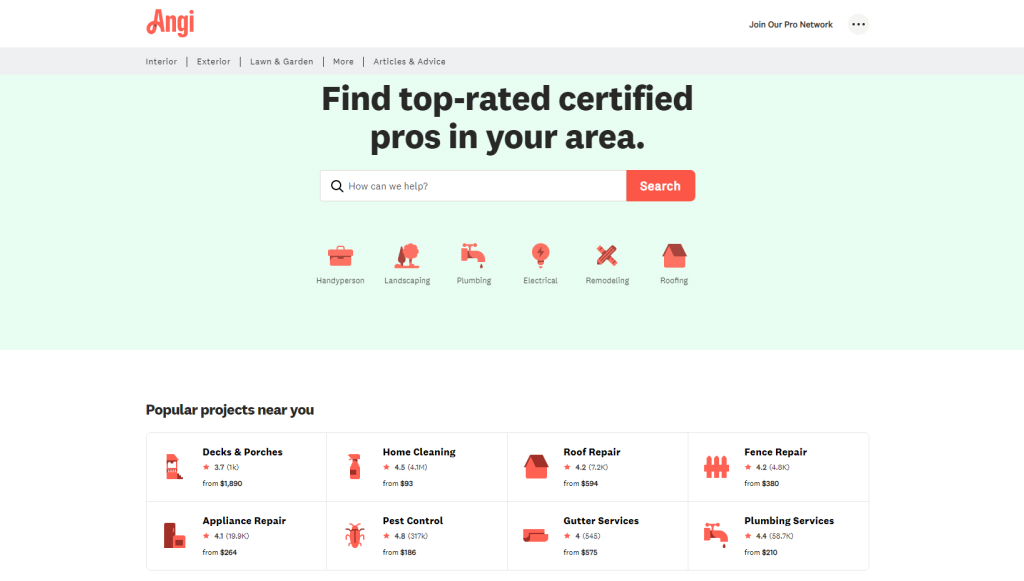
For general contractor businesses, a list of trusted directories your company should be on, including Google My Business, includes:
- Angi
- Home Advisor
- Better Business Bureau
- Construct Connect
- Yelp
- Iambuilders.com
Listing your general contractor business on reputable online directories also lets prospective customers see your company in places apart from paid ads, and helps present your business in a neutral position elevated by independent reviews.
Lastly, online directories are a low-hanging fruit that can boost your business’s backlink profile. Although search engines don’t always value these links as highly as those from an authoritative publication, the more diverse your backlinks are, the better.
Need an expert SEO partner? Find out the top SEO companies for contractors that can drive results for your business.
4. Solicit Reviews and Manage Your Reputation
87% of people won’t consider a business unless it has three to five-star reviews. Construction websites with ideal review ratings have higher click-through rates and rankings. That’s because Google uses review volume, frequency, and diversity as ranking factors.
Reviews are paramount for companies offering general contractor services as well as construction businesses because their services aren’t cheap, and clients need more than blind trust to sign on the dotted line.
Positive reviews help you generate brand recognition and a reputation for responsiveness and good customer service, as well as improve SEO. For these reasons, you should always respond to reviews and encourage customers to leave them.
Being receptive to your audiences’ feedback (good and bad) in an authentic and personalized manner also helps you connect better with your audience. You can bet if your responses to reviews are visible, potential customers will read them and make assumptions about your customer service based on how you’ve dealt with previous customer feedback.
Getting reviews across multiple websites such as Yelp, Contractor Hub, Google My Business, and other online directories makes it easier for search engines to establish the relevance and quality of your business, which is highly appealing to local searchers.
Do everything you can to increase the number of positive reviews your business receives, and don’t forget to check and respond to them regularly. Some general contractors ask for reviews by sending follow-up emails, while others send WhatsApp messages or SMS with review links.
5. Build a Mobile-Friendly Site
According to Google, more than half of all mobile searches have local intent. What’s more, the number of mobile searches for local businesses has grown by over 250% in the past few years. Consequently, a mobile-friendly website is a prerequisite for contractor company success.
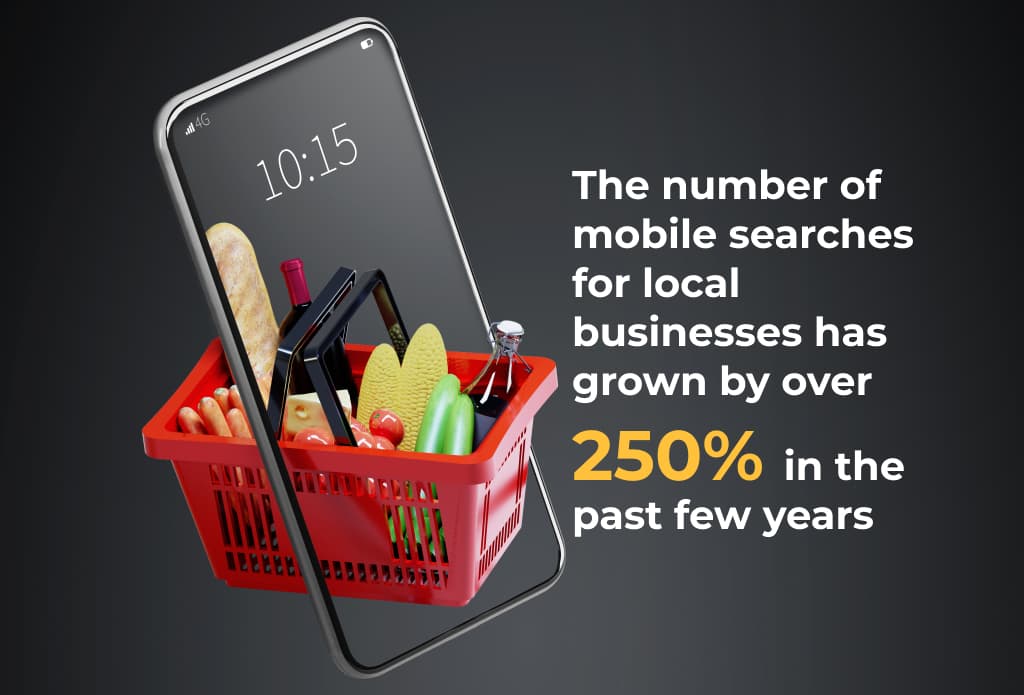
It improves user experience and ensures website visitors have no trouble finding the information they need. Use Google’s free Mobile-Friendly Test to determine how easy it is for visitors to your website from their mobile devices.
Follow these steps to optimize your web pages for mobile:
- Limit the number of clicks it takes to make a conversion. Ideally, a visitor should be able to find any information with no more than three clicks.
- Make sure every page has a clear call to action.
- Optimize page speed by using responsive web design, limited website code, and compressed images.
- Redesign pop-up advertisements for mobile devices.
- Simplify navigation with a hamburger menu.
- Place clickable content in easily accessible areas of the screen, i.e., avoid the corners and the top of mobile devices.
- Keep content concise. Ideally, each content section should be completely visible on the screen without scrolling.
Mobile use is an inescapable part of our everyday lives. Both search engines and your customers expect your construction company to keep up with their technological needs and expectations. Not having a mobile-friendly website can hurt your rankings in search engine results pages.
Boost your rankings and meet customer expectations by working with Comrade. Schedule a free consultation.
6. Have Landing Pages Optimized for Local Results
Whether you have one location or fifty, you need local landing pages to show up in local searches in those specific geographical areas. A landing page informs a search engine you operate in a certain location and have credibility there.
Local customers want convenience. They love finding companies that fulfill their demands and that are close to their homes or project sites. For multi-location businesses, landing pages are the best, and most authoritative place to find information about each branch.
For example, if your main business branch is in Chicago, but you also have offices in Indianapolis, Google won’t necessarily know that, especially if your official address is in Chicago. Practically, location landing pages also optimize your business’s web presence for different locations.
Even if you have a website (which you should), you still want to take advantage of search engine optimization opportunities afforded by local landing pages. Location-based keywords offer far more obtainable rankings than broader terms.
You can integrate powerful calls to action like contact request forms, appointment scheduling, quote requests, and click-to-call buttons into your landing pages, transforming them into conversion opportunities for your business.
7. Use Local Keywords in Your Content
Local keywords are similar to standard keywords in that they help search engines serve up your website and marketing content to consumers. However, they contain locale-specific words and phrases aimed at helping potential clients in your area learn about your products and services.
To achieve local visibility, these types of keywords often contain modifiers. For example, “best roofing company near me” or “best roofing company Chicago” (state, city, community, and so forth). Tools like Ubersuggest, Google Keywords Planner, and Moz’s Keyword Planner will help you find the most relevant keywords for your business.
Understand Keyword Hierarchy
There are three main types of keywords for search engine optimization:
- Primary keywords: These are the main focus of an article or web page, so the title and ensuing content should reflect that. Besides content marketing material, we recommend having a website page for each service as this streamlines the user experience. Your SEO strategy will also be stronger if each web page only deals with one topic.
- Secondary keywords: Oftentimes more specific and related to the searcher’s intent, secondary keywords support primary keywords and address topic nuances. Utilizing long-tail keywords—those with three-or-more words—is highly recommended as they have relatively low competition, and their specificity indicates purchase intent.
- Additional keywords: Any other related keywords that offer different variations of your main keywords are additional keywords.
Generally, you want to use one primary keyword per page. As for the rest, we recommend inserting 1-2 keywords for every 100 words of copy to avoid keyword stuffing. How many times you choose to use each type of keyword depends on the length of the content.
Your website pages should also contain primary keywords, both in the copy, titles, meta descriptions, and image alt tags. Using one of the keyword research tools we recommend will help you gauge which keywords provide the highest ROI.
Popular Keywords for General Contractors
| Keyword | Avg. Monthly Searches | Competition |
| construction companies | 110,000 | Low |
| general contractors near me | 74,000 | Medium |
| construction companies near me | 60,500 | Low |
| deck contractors near me | 9,900 | Medium |
| construction business | 1,600 | Low |
| power construction | 3,600 | Low |
| associated builders and contractors | 5,400 | Low |
| civil contractors | 1,000 | Low |
| demolition companies near me | 5,400 | Low |
| home construction companies | 4,400 | Low |
8. Start a Link Building Campaign with Other Local Businesses
Local directories aren’t the only tactic to improve your company’s backlink profile. Publishing local content and guest blogging are other ways to improve your GMB profile and rank higher in the Local Pack. Link building is important because it builds authority for your website and drives more traffic.
However, unlike other automated aspects of SEO, most contractor companies have to reach out manually to build links. This includes contacting local bloggers and websites that profile or review businesses in your area. For example, if you’re an HVAC company, you could write a blog offering tips on HVAC maintenance for a local publication, which then links back to your website.
While it’s true that the more quality content you create, the more links you’ll gain over time. Proactively reaching out can fast-track this process and raise brand awareness. The core of link building is to establish your business as a local entity and strengthen your website’s domain authority.
It’s a lengthy and time-consuming process, but once you become the most authoritative website in your area for particular queries, you will always outshine your competition at the top of Google search results, especially in local rankings.

Climb the search engine ladder - rank higher on Google with SEO solutions guaranteed to work
Get Ahead with Local SEO
Following these tips to maximize your local SEO presence will help your general contractor business outgrow its competition. Even the smallest changes can positively improve your rankings in local searches. While setting up your GMB profile is, for the most part, straightforward, you might want assistance with more technical local SEO services.
Comrade Digital marketing is a full-service digital marketing agency specializing in SEO for general contractors and construction companies. On average, we guarantee a 175% SEO traffic increase and a 35% conversion rate. Contact us today to improve your local SEO performance.
